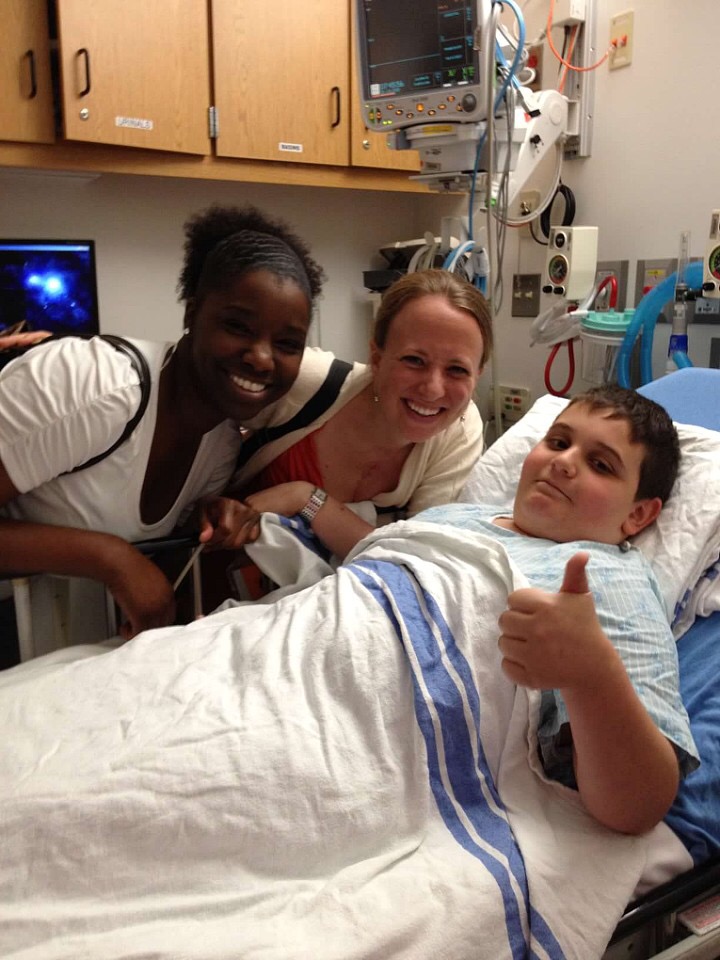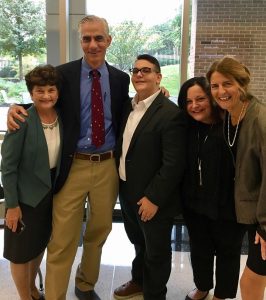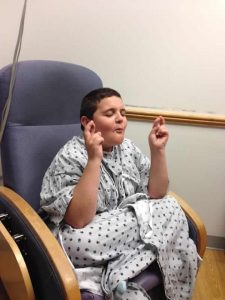After Luxturna™ Treatment: ‘Mom, Pop, is that you sitting there?’

Christian Guardino underwent experimental eye surgery five years ago with a revolutionary genetic treatment called LUXTURNA™, forever changing his life by restoring his vision.
Christian Guardino underwent experimental eye surgery five years ago with a revolutionary genetic treatment called LUXTURNA™, forever changing his life by restoring his vision that was lost due to Leber congenital amaurosis-RPE65.
On the heels of government approval of this extraordinary drug, the 18-year-old from Long Island recently had the opportunity to thank Spark Therapeutics, makers of this transformative treatment.
LUXTURNA™ is the first gene therapy for people with Leber congenital amaurosis (LCA), a rare inherited retinal disease (IRD), with an RPE65 gene mutation.
The senior from Patchogue-Medford High School recounted his experience of receiving the drug during clinical trials and thanked Spark for their incredible, life-changing work that the Food and Drug Administration approved in December 2017.
Christian’s 2013 surgery involved injecting a human-engineered virus containing copies of a normal gene so that the cells could express a protein needed by the retina to convert light into vision-enabling signals sent to the brain. LUXTURNA™ also is the first treatment of its kind in the United States for any inherited disease.
Before surgery, Christian had difficulty seeing even in very bright light; after surgery, the teen-ager, who also is an accomplished singer, experienced something astonishing as he stalled offstage, preoccupied with the night sky before performing outdoors at Long Island’s Adventureland.
“My eyes were glued to the sky and I was looking at the moon for the first time,” Christian said. “That was pretty cool.”
During his meeting with Spark, Christian also sang three songs.
He offered a true treat, singing a very bluesy version of “Who’s Loving You” by the Jackson 5, the same song he performed for his audition a year ago on “America’s Got Talent,” where host Howie Mandel hit the “Golden Buzzer” button, speeding him forward to live competition.
During that appearance, Christian answered Simon Cowell’s introductory questions with the tentativeness of any 16-year-old on stage before a packed house and millions of television viewers. Seconds before the audition, the camera flashed to audience members in hold-your-breath anticipation. When the music began, Christian brought the microphone to his mouth and belted out a soulful, strong, self-confident performance, belying his youth and bringing the audience to its feet.
Christian, whose musical heart is in soul and the Motown sound, recently said: “There’s just so much truth and meaning in soul and Motown. To have that kind of soul, you have to be really down in life.”
At the meeting with Spark, Christian also sang “Rise Up” by Andra Day and “Don’t Stop Believing” by Journey.

From left, Children’s Hospital of Philadelphia Research Coordinator Kathy Marshall, Dr. Albert Maguire, Christian, Christian’s mom, Beth, Dr. Jean Bennett; at Oct. 2017 FDA Advisory Committee LUXTURNA meeting.
From that meeting, Christian, his mom, Beth, dad, Nino, and younger brother, Nicholas, traveled to Orlando, Fla., where he was one of 10 national champion ambassadors – patients who triumphed over great odds – for the Children’s Miracle Network Hospitals (CMN Hospitals), a national organization raising funds and awareness for 170 children’s hospitals.
He represented Children’s Hospital of Philadelphia (CHOP), as their national champion, at the invitation of LUXTURNA™ developers, Drs. Jean Bennett and Albert Maguire.
After performing there, Hunter Hayes, a Grammy-nominated singer/songwriter, surprised Christian by telling him he was a big fan and inviting him to a future studio session.
The hunt for a genetic diagnosis
Christian’s mother, Beth, noticed that his eyes did not track when was about 3 months old and that he did not make eye contact, rather gravitating to light sources. Doctors suspected some sort of eye disease, including LCA.
His family noticed something else different before he was even 6 months old, when a visual therapist worked with Christian to track the song “Twinkle, twinkle, little star” on video.
“All of a sudden, in his bouncy seat,” Beth said, “He starts humming, ‘Twinkle, twinkle, little star, how I wonder what you are…’ ”
“Is that normal?” she asked the therapist, who looked at her and said, “Noooo!”
He would repeat everything he heard, singing scales and la-la-la-la-la-la-la-la all over the house.
“His musical ability, even as an infant and a toddler, was just off the charts,” Beth said. “I knew it was really something different.”
After having “every test under the sun,” doctors diagnosed Christian with LCA at 9 months old.
“At the time, so little was known about LCA. They didn’t give us much information.”
Doctors told her then that his vision would be stable or slightly improved, which turned out not to be true.
A pediatrician then referred Christian to a geneticist, to no avail.
“That’s one thing that actually surprises me now. Even back in 2000, they were not able to identify his gene.
“There was nothing we could do. We enrolled him in early intervention and had to accept the fact that he was visually impaired. We just did the best with what we had.”
When he was about 10 or 11, Christian started missing things, even in bright light, and when he didn’t recognize a friend at a church barbeque, Beth knew something was not OK.
She found information online and signed up for a family conference in Philadelphia sponsored by the Foundation for Retina Research, which has since melded into the Foundation Fighting Blindness (FFB).
“We found out during a presentation that he was going to go completely blind,” Beth said. “Here we were, sitting in a roomful of acquaintances, that was kind of hard to hear.
“It was really, really overwhelming, and I literally had to fight not running out of that room because I was really so completely…,” she paused saying through tears, “It’s emotional.”
Joining the clinical trial
Christian was genetically tested at that summer 2012 conference and received results in March 2013. Dr.
Bennett also tested the sample in her lab and was 90 percent sure he had RPE65.
“We agreed to be part of the research,” Beth said. “Whatever we can do to help get things further along.”
Three months later, Christian underwent surgery.
“The first thing was really when I woke up, I was in a very, very dark room with one little lamp. ‘Dominique, is that you?’ ” Christian asked, referring to Dominque Cross, a CHOP research coordinator sitting in the room.
“I didn’t even know what to think because I’ve never really seen in a dark room. It was hard to get used to because I was used to what I saw before.”
His eyes were treated a week apart.
Beth said, “My husband and I were sitting in the room.” The doctor took off the patch and “his head turned in our direction. ‘Mom, Pop, is that you sitting there?’ ”
The whole room erupted.
Returning to school as an eighth-grader, Christian said, “It was kind of crazy because I could walk down the hall and see someone waving to me, instead of being antisocial. I wasn’t actually antisocial (before) but I seemed antisocial. Now I could see who I was talking to. It was pretty awesome.”
Shortly after surgery, he began performing with Idolmaker USA, a local talent-show company, and then went on to win Amateur Night at the Apollo Theater, marking his entrance into the real world of singing.
Christian’s now a senior and even as he talked, he couldn’t believe he’s so close to graduating.
“I graduate in June and that’s in, like, three months. It’s really just hitting me now.”
But it’s not like Christian doesn’t have plans.
“I just want to follow my career, singing, get in the studio and put out some of my own stuff.”
He recently worked with Sacha Skarbek, a British songwriter and record producer who has written songs for James Blunt and Miley Cyrus and worked with Adele, Lana Del Ray, Tears for Fears and others.
The songwriter chose one of his songs for Christian to record and then donated it to the Vision of Children Foundation, which is making a documentary called “Vision Hero.”
The name of the song and its lyrics are top secret for now, but Christian did say he recorded the song last month in Los Angeles.

